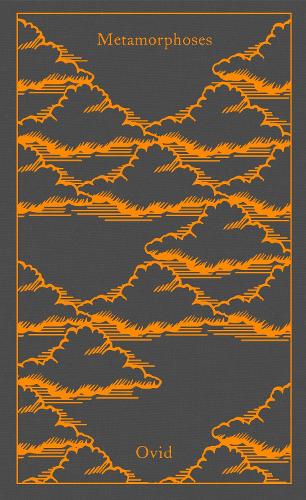
Metamorphoses
(Hardback)
Available Formats
Paperback, New edition
Published: 1st January 2005
Hardback
Published: 28th May 2014
Paperback
Published: 14th April 2004
Hardback
Published: 24th September 2010
Paperback
Published: 24th September 2010
Hardback
Published: 10th January 2023
Paperback
Published: 6th February 2024
Publishing Details
Metamorphoses
By (Author) Ovid
Translated by David Raeburn
Introduction by Denis Feeney
Penguin Books Ltd
Penguin Classics
28th May 2014
3rd April 2014
United Kingdom
Classifications
General
Non Fiction
Poetry / poems by individual poets
Literary studies: poetry and poets
Literary studies: ancient, classical and medieval
873.01
Physical Properties
Hardback
768
Width 140mm, Height 205mm, Spine 45mm
887g
Description
Ovid's deliciously clever and exuberant epic, now in a gorgeous new clothbound edition Ovid's sensuous and witty poetry brings together a dazzling array of mythological tales, ingeniously linked by the idea of transformation - often as a result of love or lust - where men and women find themselves magically changed into new and sometimes extraordinary beings. Beginning with the creation of the world and ending with the deification of Augustus, Ovid interweaves many of the best-known myths and legends of Ancient Greece and Rome, including Daedalus and Icarus, Pyramus and Thisbe, Pygmalion, Perseus and Andromeda, and the fall of Troy. Erudite but light-hearted, dramatic yet playful, the Metamorphoses has influenced writers and artists throughout the centuries from Shakespeare and Titian to Picasso and Ted Hughes.
Reviews
McCarter confronts the tricky issues associated with both the poet and his epic not only in her forthright introduction but in the translation itself, where, like an art restorer removing decades of browned varnish from an Old Master, she strips away a number of inaccuracies and embellishments that have accreted in translations over the decades and centuries, obscuring the sense of certain passages, particularly those portraying women and sexual violence McCarters translation reproduces Ovids speed and clarity. Even better, she is alert to many of the sparkling verbal effects for which the poet was famous in his own time If you didnt know she was writing about the concerns of someone who died twenty centuries ago, youd think her subject was still alive.
Daniel Mendelsohn, The New Yorker
The Metamorphoses has it all: sex, death, love, violence, gods, mortals, monsters, nymphs, all the great forces, human and natural. With this vital new translation, Stephanie McCarter has not only updated Ovid's epic of transformation for the modern ear and era --- she's done something far more powerful. She's paid rigorous attention to the language of the original and brought to us its ferocity, its sensuality, its beauty, its wit, showing us how we are changed, by time, by violence, by love, by stories, and especially by power. Here is Ovid, in McCarter's masterful hands, refreshed, renewed, and pulsing with life.
Nina MacLaughlin, author of Wake, Siren: Ovid Resung
Stephanie McCarters gorgeous verse translation of the Metamorphoses is ground-breaking not just in its refreshingly accessible approach to Ovids syntax and formal devices but for how she reframes the controversial subjects that have made Ovid, and Ovidian scholarship, so fraught for contemporary readers. McCarters translation understands that the Metamorphoses is a complex study of power and desire, and the dehumanizing ways that power asserts itself through and on a variety of bodies. McCarters deft, musical, and forthright translation returns much needed nuance to Ovids tropes of violence and change, demonstrating to a new generation of readers how our identities are always in flux, while reminding us all of the Metamorphoses enduring relevance.
Paisley Rekdal, author of Nightingale
Author Bio
Ovid (43BC-18AD) was born at Sulmo (Sulmona) in central Italy. Coming from a wealthy Roman family and seemingly destined for a career in politics, he held minor official posts before leaving public service to write, becoming the most distinguished poet of his time. His works, all published in Penguin Classics, include Amores, a collection of short love poems; Heroides, verse-letters written by mythological heroines to their lovers; Ars Amatoria, a satirical handbook on love; and Metamorphoses, his epic work that has inspired countless writers and artists through the ages. David Raeburn is a lecturer in Classics at Oxford, and has also translated Sophocles' Electra and Other Plays for Penguin Classics. Denis Feeney is Professor of Classics at Princeton.
